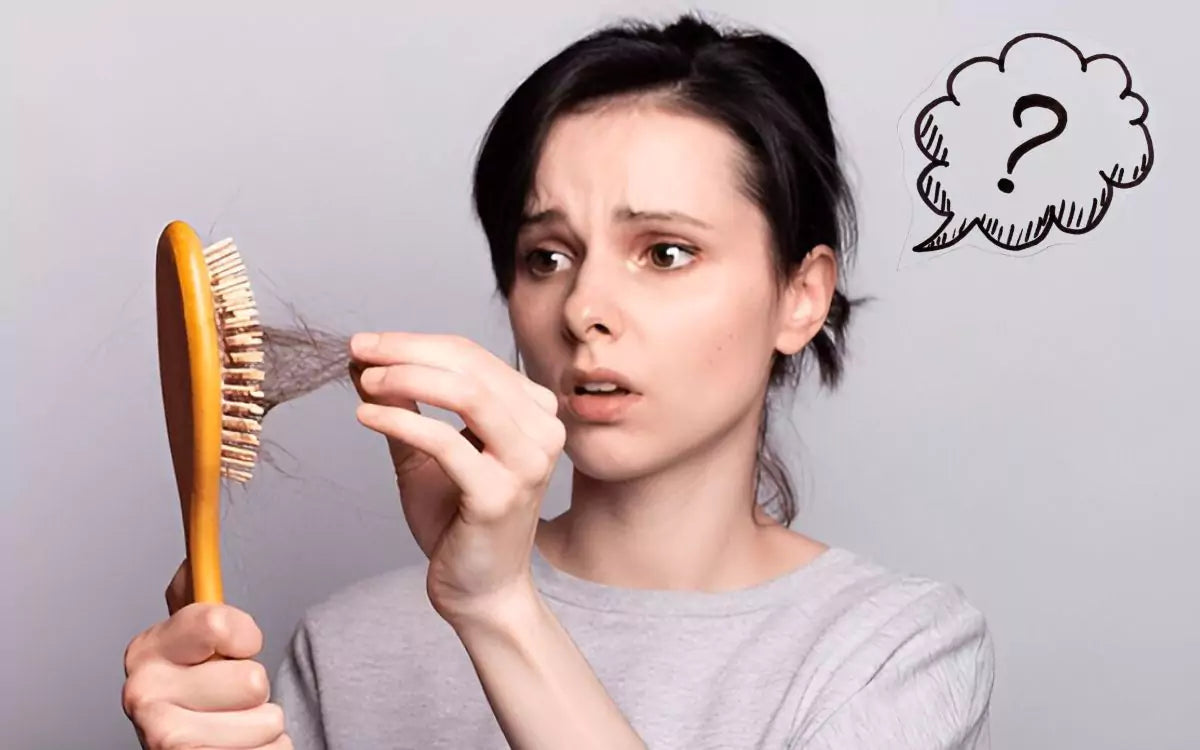Hair falls can happen due to various health-related factors, such as alopecia areata, nutrient deficiencies, or even medication. The treatment plan for hair loss depends on its cause. If the issue is linked to a medical condition, addressing the root cause is key. Let’s explore the causes, signs, and solutions for hair fall in depth.
Hair Fall Stages: Understanding the Growth Cycle
Your hair follows a four-stage growth cycle:
- Anagen Phase (Growth): This active phase can last 2–6 years, with 5% of your hair in this stage.
- Catagen Phase (Transition): A brief stage where hair detaches from the follicle, lasting a few weeks. Hair detaches from its blood supply and stops growing.
- Telogen Phase (Rest): Hair remains in place but stops growing for about 2–3 months. Around 10–15% of your hair is in this phase at any time.
- Exogen Phase (Shedding): Old hair falls out, and new strands begin to grow. It’s normal to lose certain numbers of hair daily during this phase.
When the balance of these stages is disrupted, such as during stress or illness, hair loss can increase.
What Causes Hair Fall?
Hair fall can happen for various reasons, and they often differ between genders:
For Men:
- Male-Pattern Baldness: Often hereditary, caused by sensitivity to the hormone DHT (dihydrotestosterone).
- Lifestyle Factors: Poor nutrition, lack of sleep, and high-stress levels accelerate hair loss.
For Women:
- Hormonal Imbalances: Conditions like PCOS, pregnancy, or menopause disrupt the hair growth cycle.
- Iron Deficiency: Women are particularly prone to iron deficiency anaemia due to menstruation or pregnancy.
- Hair Treatments: Frequent heat styling, bleaching, or tight hairstyles can damage hair shafts.
Shared Causes:
- Medical Conditions: Hair loss can be caused by thyroid problems, autoimmune diseases (such as alopecia areata), and scalp infections.
- Stress: Physical or emotional stress can push hair into the resting phase, causing temporary shedding (Telogen Effluvium).
- Poor Diet: A lack of essential nutrients like iron, zinc, or biotin can weaken hair structure.
Types of Hair Fall
There are several forms of hair loss, each with distinct causes and characteristics:
- Androgenetic Alopecia: Commonly known as male or female pattern baldness, this is hereditary.
- Telogen Effluvium: Temporary shedding caused by stress, surgery, or hormonal changes.
- Alopecia Areata: An autoimmune condition where the immune system attacks hair follicles, leading to patchy baldness.
- Traction Alopecia: Resulting from tight hairstyles or repeated tension on the scalp.
- Scarring Alopecia: Permanent hair loss due to scarring from conditions like lupus or severe infections.
Sudden Hair Fall: What Could Be Behind It?
Sudden, dramatic hair loss can be alarming. Here are a few potential culprits:
- Physical or Emotional Stress: A traumatic event or illness can disrupt your hair cycle.
- Nutritional Deficiencies: A diet lacking essential nutrients like iron or protein can cause noticeable thinning.
- Medical Treatments: Chemotherapy, radiation, or strong medications often cause temporary hair loss.
- Hormonal Shifts: Pregnancy, postpartum changes, or thyroid imbalances can lead to sudden shedding.
What is the Connection between stress and hair fall?
Chronic stress doesn’t just affect your mental health—it impacts your hair too. Prolonged stress can cause:
- Telogen Effluvium: Stress can push hair follicles into the resting phase prematurely, leading to excessive shedding.
- Alopecia Areata: Severe stress might trigger this autoimmune condition, causing patchy hair loss.
- Cortisol Levels: Chronic stress raises cortisol levels, which can weaken hair follicles over time.
Managing stress through activities like yoga, meditation, or even regular exercise can help protect your hair health.
How Much Hair Fall Is Normal?
Did you know that losing 50 to 100 hair strands daily is entirely normal? Your hair undergoes a natural cycle that includes growth, rest, and shedding phases. It is natural for a certain amount of hair to shed every day. However, if your pillow, shower, or comb starts accumulating unusually large amounts of hair, it may be time to investigate further.
How to Prevent Hair Fall and Keep Your Hair Healthy?
Preventing hair loss involves a holistic approach:
- Eat a Balanced Diet: Include iron-rich foods (leafy greens, beans), protein (eggs, fish), and vitamin-rich foods (oranges, nuts).
- Be Gentle with Hair: Avoid tight hairstyles, excessive heat, or harsh chemicals.
- Stay Hydrated: Proper hydration supports overall hair health.
- Reduce Stress: Practice mindfulness, yoga, or deep breathing to manage stress.
- Consult Experts: If hair loss persists, see a dermatologist for a tailored treatment plan.
Final Thoughts
Hair loss is a concern that affects everyone at some point. While losing a few strands daily is normal, excessive hair loss warrants a closer look at one's lifestyle, diet, and overall health. By understanding the causes and solutions, one can take proactive steps to protect and nourish one's hair.
Are you ready to tackle hair fall? Explore our range of supplements and take the first step toward stronger, healthier hair!
References:
Why Am I Struggling with So Much Hair Fall?

